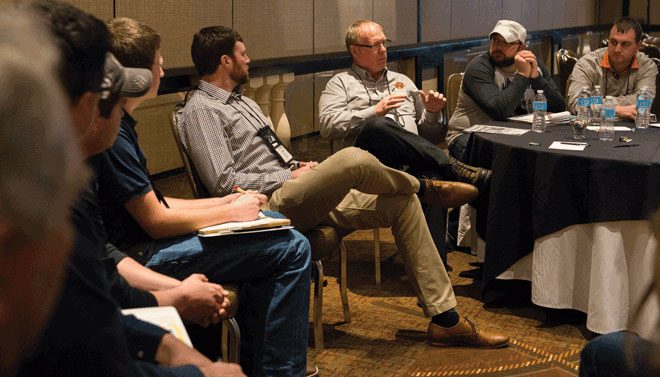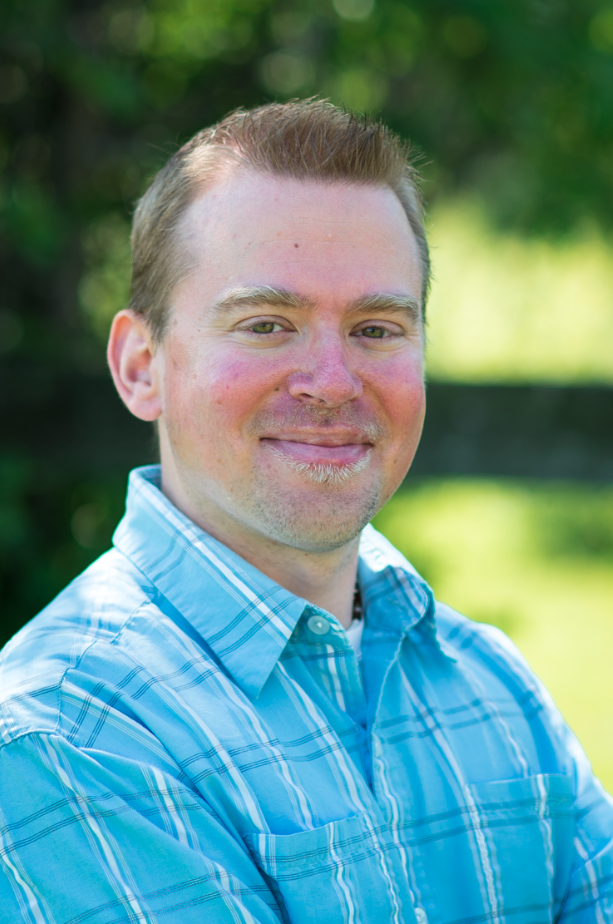While in-person meetings provide valuable face-to-face contact, the chaotic schedules of precision managers don’t always allow for coordinated sessions.
In 2018, a group of John Deere precision farming managers, organized by Phil Moskal from Mid-State Equipment, began communicating via text message to assist each other with troubleshooting in-field problems or trading insight on new products or services.
Precision Farming Dealer assembled a geographically diverse group of 8 different precision farming managers to discuss their involvement and interaction in a virtual peer group to exchange ideas, problem-solve and provide a source of professional therapy.
Precision Farming Dealer: How did such a geographically diverse group of dealers come together — was is structured or more organic?
Phil Moskal: “Back in December of 2018, I sent out a text message to most of us Corn Belt dealers in the group and that developed into a series of conversations. Over time, it got too big for text message. So we moved to a different platform and as it’s gone along, we’ve added people that are mostly noncompeting dealers. We can be open and honest with each other because it’s part therapy and part information exchange.”
Meet the Members
John Marshall, Precision Ag Director, Wade Inc.
Rudy Raatz, Precision Ag Manager, SEMA Equipment
Phil Moskal, Precision Ag Solutions Manager, Mid-State Equipment
Karl Huebner, Integrated Solutions Manager, Hutson Inc.
Kori Richter, Integrated Solutions Manager, Tractor Central
Chad Lantz, Precision Technology Manager, TTG Equipment
Matt Wright, Integrated Solutions Manager, Legacy Equipment
Arthur Etheridge, Integrated Solutions Manager, Shoppa’s Farm Supply
Chad Lantz: “Most of us get together once or twice a year at some sort of John Deere meeting and have discussions. But the feeling was it would be beneficial to have these discussions year round. It’s a great source of knowledge.”
PFD: Is there a situation where being part of this group has proven especially valuable in getting a question answered or getting some outside perspective on an issue?
Arthur Etheridge: “I don’t want to steal John Deere’s line — it’s another tool in our toolbox — but it absolutely is. These guys see problems that we’re all going to see eventually, and it’s best if we know sooner rather than later how to deal with something. With Deere’s JD link, the 2G phased out, 3G is going to be phased out, going to 4G and so on. Just how different people use that and deal with that on a daily basis has been a huge benefit to me, personally, and then for the dealership as well.”
Karl Huebner: “For me, what it comes down to is there is a certain group of people within each dealership that just know the machine. They are the consultants of that company and let’s be honest, at times, we don’t know the answer. We’re learning something new every day.

“If I or anyone else in the group can provide a few months lead time to someone else on a problem, that’s valuable information…” – Karl Huebner
“Some of our businesses have a higher degree of adoption for precision than others — whether it’s further along with planters or manure spreaders. So we’re incredibly diverse in that aspect.
“But whenever I hit the group text, I’m talking to the best of the best in that organization on that product. And most likely they’re going to get me pretty close to headed in the direction I need to be. That’s hard to find because in the AMS world, John Deere doesn’t always have the answer.
“There is going to be some brainstorming, and when I do it with a group of people that are experts, it makes me much more efficient in my role.”
Kori Richter: “A couple years ago, we had a situation where a lot of labs were just freezing up and, Phil tipped us off to having to backdate the controller software on the chopper.
That’s just something you’re just not going to get from Deere and when we backdated that software, it fixed our lab issues. That’s a very specific example, but that’s kind of the thing that’s going on.”
PFD: With the diversity of managers in this group, does the communication allow you to be more proactive than reactive with troubleshooting problems, whether in the field or even with employees?
Moskal: “It’s a little of both. That’s why I added all the guys from the South because they’re the unofficial software testers for John Deere. They get into the fields first, and they find all the bugs. I’m kidding, but at the same time, we can ask questions about problems that they encountered before our customers get into the field.
“Maybe one of us saw it a week ago and remember what to do, or we can give the group a heads-up about a software issue. There’s still some reactionary response, but we are able to be more proactive in some respects.”
Etheridge: “In the southern states, we’re first in lots of things as far as having ears on the stalk and we’ll be the first to harvest. But I’d says it’s averaged about a 2-5 year adoption difference in terms of technology adoption in the Midwest vs. what we see in our area. They’ve got a head start on us. So I’m seeing stuff that they’ve already dealt with and fixed. But it’s a two-way street because our sprayers and combines are running earlier, so we can clue them into anything we’re seeing.”

“These guys see problems that we’re all going to see eventually, and it’s best if we know sooner rather than later how to deal with something…” – Arthur Etheridge
John Marshall: “I’m also down in the southern part of the country. Even though we don’t do the same things as the dealers in the Midwest — we raise cotton and they raise canola — we can learn a lot from what each of us is experiencing. Even if we don’t have the same type of equipment, the problems still tend to be the same. We lean on each other a lot.”
Huebner: “If I or anyone else in the group can provide a few months lead time to someone else on a problem, that’s valuable information. It can save embarrassing or costly situations with customers by saying, ‘don’t update this’ or something along those lines. I think more of this type of communication is going to have to happen to help dealers avoid tripping over those same rakes.”
Rudy Raatz: “As Integrated Solutions departments, we’re not just responsible for our department, but also in some cases, making sure the sales department is working with us on the sales side. I know a lot of us have some test programs in the works, and I had mentioned to the group that we’re doing a SEMA Certified program as a way to mainstream our sales team on selling precision equipment and services. It’s a collective effort with sales, service and parts.”

“We can actually get the inventory from other dealers in this group faster than we can get it from Deere…” – Rudy Raatz
Lantz: “We do a very good job of communicating business strategies, with each other, just because we don’t compete. I can remember asking a question about a process that I was looking to implement and some of the guys said, ‘You know what I did that and it didn’t work, and here’s why.’
“That feedback allowed me to tweak before I even launched, so to speak. So it made me a little bit more successful. Another benefit is if I run out of a product, I know I can put a message out, ‘Hey guys, got any receivers?’ So we help each other with new and even used inventory.”
Raatz: “We can actually get the inventory from other dealers in this group faster than we can get it from Deere. There was one time I needed an activation and one of the former members of this group, bailed me out. I think it was like a Friday night at 11:00 p.m. I had ordered it from Deere at 8:00 a.m. that morning and it still wasn’t a good activation, the other dealer sent me the code and we got it going.
“Not only are we working together on the dealership side, but we’re working together on the business side to keep the products we need in the customer’s hands.”
Collaborators not Competitors: Establishing an External Precision Support Network
Jordan Gaal, Contributing Writer
Collaboration is usually the answer to solving a complex problem, and precision farming is no exception. Peer groups are a common way for small, independent dealers and larger, multi-store OEM retailers alike, to share ideas and strategies.
But why would you join a group to share ideas with your competitor? Here are a few things to keep in mind when joining a peer group and shifting your focus from an individual perspective to shared vision.
To validate your best ideas, use a collaborative approach. The diverse number of products and systems available in precision farming means your dealership doesn’t carry everything. Use this collaboration to direct farm customers to other dealers that may be able help. It all comes back to the relationship you’re building with the neighboring dealers and the farmers.
The days of outselling someone are gone. In the age of the internet, growers often know the equipment they need and dealers need to collaborate to be the solutions provider. The product itself and its service needs may require more knowledge than just one dealership is able to provide.
“The technology requires collaboration. The single most important factor is networking,” says Jayme Paquin of Reichhardt Electronic Innovations in Sabin, Minn. Sometimes, asking another dealer for potential solutions to problems will be much quicker than reaching the manufacturer directly.
“When you step back and put yourself in the position of the precision specialist, we’re just here to make it work and if that means calling up the neighboring dealership, so be it,” says Rod Capitani from Martin & Sullivan in Roanoke, Ill. “There’s strength in numbers when providing support for new technology.”
When you share information, expect information in return. In a peer group, be cautious of sharing sales data and specific customer pricing information. The purpose of a peer group isn’t to take customers from other dealers, but it is an opportunity to problem-solve and idea share.
Establishing a peer group could be as simple as gathering at a local meeting spot once a month. Dealers agree that every peer group needs a leader to coordinate meetings and discussion topics. Share contact information so ideas and questions can be easily relayed to each other.
A newly established peer group should have a concrete goal. Develop the goal based on what the precision dealer needs are in the area. The goal could be motivating and finding employees, producing better marketing strategies and promotions, creating a troubleshooting network or even just developing friendships. A facilitator can be hired or invited to ensure things continue on track if the goal needs to be met in a timely matter.
Overall, a peer group can ensure that you are able to provide solutions to all customers and build better relationships with neighboring dealers that will provide long-term benefits.




![[Technology Corner] Helping Your Customers Determine Which Technology is Right for Them](https://www.precisionfarmingdealer.com/ext/resources/2025/03/26/Helping-Your-Customers-Determine-Which-Technology-is-Right-for-Them.png?height=290&t=1743084621&width=400)


